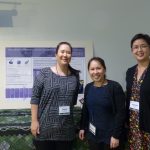Pediatric Dental Care Curriculum Component Integrated in the Existing Dental Hygiene Program
Children in Hawaii experience the worst oral health outcomes nationally. Seven out of 10 third graders experience tooth …


Children in Hawaii experience the worst oral health outcomes nationally. Seven out of 10 third graders experience tooth …

A successful Animal Science program produces graduates that are well-prepared to assume professional roles in the work force …

Practicum assessment utilizes an approach that helps ensure the masters of public health (MPH) students learn to take …